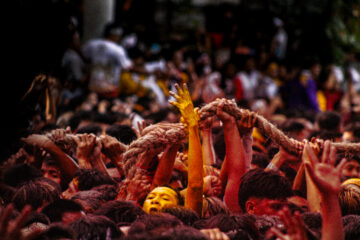By ZYMON ARVINDALE R. DYKEE

INSIDE THE comfort room of a plane in flight, a middle-aged woman quietly bears on the toilet her second child. Heavily panting while her gaze shifts between the sink and the toilet, she decides to regard the bloody infant as unwanted baggage.
Zig Dulay’s award-winning entry for the 13th Cinemalaya Philippine Independent Film Festival thrusts the viewers immediately and without ceremony into the conflict. Mercy (Angeli Bayani), an overseas Filipino worker on her way home to Benguet, rids her baby sired by his boss by stuffing it into the plane’s trash. Two days after she arrived, officers of the National Bureau of Investigation crash into her place, demanding that she join for an investigation. Upon nervously submitting herself and boarding their van to Manila, she has unknowingly boarded a trip in which her return to the warm arms of her loved ones is dim.
As she steps on the concrete crowded jungle that is the capital, her quiet nature blends into the noise and the chaos caused by her crime. She falls into the hands of the brash head of the investigation, the unconcerned gynecologist, and the intruding news reporters. She feels that life pricks her more as she is reminded by mothers carrying their children in their arms, and by babies nursed in a hospital. Yet it does not take long before Mercy finds home in the welcoming shelter for single female parents, the caring psychiatrist, and the female senator championing women’s rights.
The film zeroes in on the plight of abused Filipino women overseas. For the price of better living balloons nonstop, they are forced to fly to foreign lands, where money is earned much quicker and bigger. This chance, however, requires them to put on a brave face, for in these lands, Filipinos are most of the time belittled. Such case is Mercy, who reveals herself to have been raped by her boss.
Angeli Bayani, who bagged the film festival’s Best Actress award, portrays the traumatized motherly figure perfectly. Her face is often blank and her smiles are always occasional and small. When her memories are triggered, she panics and explodes while her cheeks are tainted with tears. She is also silent and still, and when approached, her responses are kept short.
Meanwhile, the shaky camerawork, which is obviously unintentional, throughout the film partakes of an unstable quality similar to that of Mercy’s hysteria. It can be seen as foregrounding the frantic feeling in times of fear. Thus, it takes on the task of stripping trauma down to its barest form, where there exists no more pretense on how grim it is to be abused.
Bagahe reflects on the burdens people prefer to be closemouthed about until they take on a desperate resolve. It pulls the viewers into a two-hour flight where the plane’s compartment is surprisingly loaded with emotional baggage. F



